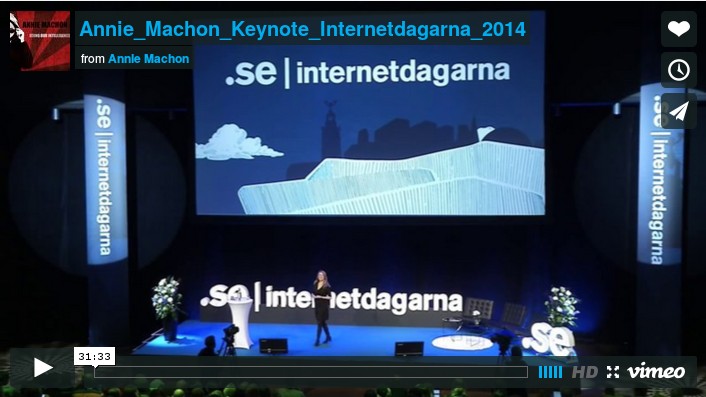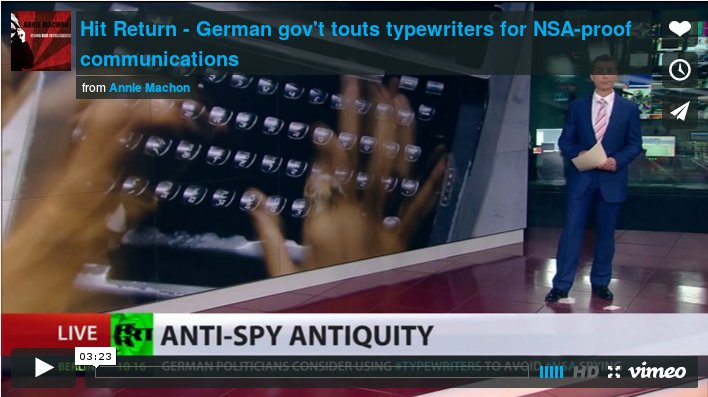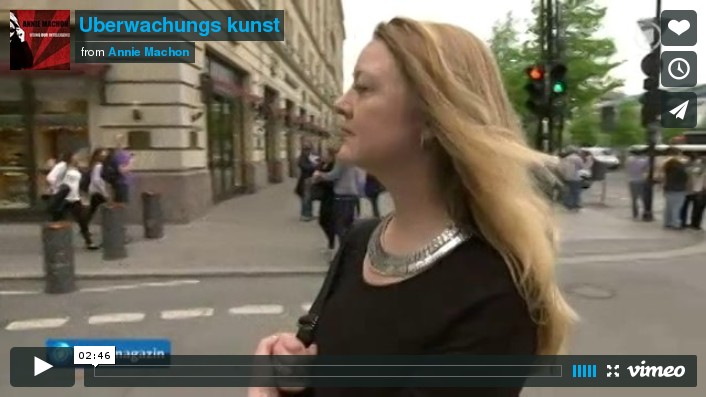My recent interview about the German domestic spy agency, the BfV — the Office for the Protection of the Constitution, ironically — being allegedly infiltrated by ISIS.
ISIS Agent in German Spy Agency from Annie Machon on Vimeo.
My recent interview about the German domestic spy agency, the BfV — the Office for the Protection of the Constitution, ironically — being allegedly infiltrated by ISIS.
ISIS Agent in German Spy Agency from Annie Machon on Vimeo.
Here is my keynote speech at the recent Internetdagarna (Internet Days) conference in Stockholm, Sweden, discussing all things whistleblower, spy, surveillance, privacy and TTIP:

A comment piece from last week on RT about German politicians wanting to go back to paper-based communications to evade the US spy panopticon:

And here is the full text of the interview I gave on RT Op Edge:
Both typewriter and strong encryption is going to slow down communication, but upholding a basic democratic right of privacy seems to be more important, former MI5 agent Annie Machon told RT.
Amid the American-German espionage scandal, German politicians are considering going back to old-fashioned manual typewriters for confidential documents in order to protect national secrets from American NSA surveillance.
RT: Why would Germany think of using typewriters as a security measure?
Annie Machon: What I find interesting is that we have a situation where even our democratically elected representatives have to think deeply and seriously about how to protect the privacy of their communications, particularly when the investigation of the very subject of invasion of the privacy of the citizens, which is what the Bundestag at the moment is doing in Germany, trying to hold hearings to work out what exactly the NSA has been doing, which might be contravening the constitution of Germany. It is very difficult now but it is still possible to protect your electronic communications, but I think this announcement, this sort of statement by the Bundestag representative about going back to typewriters is interesting. It just makes a very strong point that we all need to be aware of the fact that we can be spied on at any time.
RT: Do you think everyone would follow Germany’s example?
AM: I think more and more people are concerned about their privacy because of the Edward Snowden disclosures. He has done the world a huge service with great personal cost, exposing the predations of the US Intelligence agencies and the NSA particularly, as well as a number of European agencies. In the past all countries spied on each other because they wanted to gain advantage over other countries, not necessarily their enemies, just an advantage economically or politically. However, what we are seeing at the moment is the result of what was the perfect storm for the USA in the 1990s, it was a perfect opportunity for them, because at that point the Cold War had ended, they were the sole remaining superpower on the planet, and precisely at that moment we had the evolution of the internet, a huge tech explosion of communications. They saw the opportunity and they went for it. Of course they did because that meant that they could embed whatever they wanted into the infrastructure that the whole world now uses for communication. Of course they were not going to turn this opportunity down, and they haven’t. That is what Edward Snowden disclosed.
So we have the situation now when everything can conceivably be hoovered up by the NSA and its vassal states in Europe, everything can conceivably be stored for ever and be used against citizens in the future if the laws change. And everything can conceivably be known amongst the private deliberations of our parliament’s democratically elected representatives. It’s worse than Orwellian.
It would be naïve to think that the US would not take up this opportunity, but of course they did, and these are the results we are living in. It would be lovely to think that we could go back to the era of having privacy in our lives that our governments would have power to ensure we had it, but in this globalized world it is very difficult to ensure that. One of the things that is little known out of all Snowden’s disclosures is the fact that it is not just what we send over the internet, it is also hardware, the computers, the technology we actually use that can already be compromised by the NSA. This is one of the things that came out just after Christmas last year. So we are living in a very complex world but there are very simple steps we can take, both the governments and the citizens, to protect our democratic and our basic right to privacy.
RT:Wouldn’t using typewriters slow things down in terms of communication? Why not use other, more modern ways of protecting communication?
AM: Either going back to using pen paper or typewriter or using very strong encryption is going to slow down one’s communication, there is no doubt about it. The point is though, what is more important, is it access to the latest celebrity gossip on the internet or is it actually upholding a basic democratic right of privacy. Because if we don’t have privacy, then we lose our freedom to communicate easily and in private, we lose our freedom to ingest information via video, audio or from reading, we cannot plan, we cannot conduct private personal relationships over the internet. So what is the price of a little bit of inconvenience when it comes to protecting our basic rights? I think that however light-heartedly the German politician mentioned using typewriters, when it comes to proper security issues within government, he is probably absolutely right. Last year there was a report as well, saying that some of the Russian security operators were now using typewriters too. We will all have to think about that, and it’s just a jolting wake up call to make us all think about that by stating that the German government is now going back to typewriters for certain things.
RT: What kind of solution do you see? Should people rely on their governments for protection of their privacy?
AM: There is a danger that people and the government will become very paranoid about trying to protect against the predations of the NSA and its vassals in Europe. However, I’m not sure as we as citizens can rely on governments to protect our privacy because all governments would want to know what is going on on the internet for legitimate reasons as well, to try to track down the illegitimate criminals and terrorists. But it can be easy for them to hoover up all the personal information and we, as citizens, need that have that guarantee of privacy. So one of the things we can do as citizens is to take responsibility in our own hands. We can indeed source all technologies, source computers pre-2008 that have not built-in hardware backdoors. We can use decent PGP encryption, we can use Tor to hide what we are looking at in the internet, we can use other encryption methodologies to protect our privacy, and we need to. I think it’s a very interesting crossroads in our history, both as civilizations, as democracy and as individuals, but also how we view the technology, how we use it, how we can better use it to protect our life, so that is going it be an ongoing debate. I’m very pleased to see this in Germany particularly. The politicians seem to be waking up around these issues and wanting debate these issues because the USA has got away with it for long enough across the West.
The 27th European Media Art Festival began this evening in Osnabrueck, Germany. In the wake of all the global intelligence whistleblowing that has gone on over the last few years, the theme for the artists of 2014 is “We, the Enemy”.
Do visit if you can — a lot of interesting and political art installations are on display, as well as films, music, and talks. I shall be doing a talk on speaking on Friday afternoon.
I had the pleasure of making a short speech at the opening ceremony this evening, and did an interview for national German TV channel ARD last night to publicise the festival.

Uberwachungs kunst from Annie Machon on Vimeo.
Here is my recent talk at the CCC in Hamburg, discussing the war on terror, the war on drugs, the war in the internet and the war on whistleblowers:
30C3 — The Four Wars; Terror, whistleblowers, drugs, internet from Annie Machon on Vimeo.
Here is an interview I did for Voice of Russia radio in London last week about spies and their relationship with our democratic processes, oversight, Edward Snowden and much more:
Voice of Russia radio interview from Annie Machon on Vimeo.
A recent interview on BBC World Service radio, on “World Have Your Say”. An interesting debate with some other former intelligence types:
BBC World Service “World Have Your Say” interview from Annie Machon on Vimeo.
Here’s my recent interview on London Real TV, discussing all things whistleblowing, tech, intelligence, and the war on drugs. Thanks Brian and Colin for a fun hour!
Here is a taster of my recent interview on London Real TV. It was diverse, lively and fun, and should be broadcast in full tomorrow:
Annie Machon — Whistleblower — London Real TV from Annie Machon on Vimeo.
First published by RT Op-Edge.
Andrew Parker, the Director General of the UK’s domestic security Service (MI5) yesterday made both his first public speech and a superficially robust defence of the work of the intelligence agencies. Reading from the outside, it sounds all patriotic and noble.
 And who is to say that Parker does not believe this after 30 years on the inside and the MI5 groupthink mentality being what it is? Let’s give him the benefit of the doubt. However, I have two problems with his speech, on both a micro and a macro scale.
And who is to say that Parker does not believe this after 30 years on the inside and the MI5 groupthink mentality being what it is? Let’s give him the benefit of the doubt. However, I have two problems with his speech, on both a micro and a macro scale.
Let’s start with the micro — ie the devil in the detail — what is said and, crucially, what is left unsaid. First up: oversight, which the spook apologists have dwelt on at great length over the last few months.
I wrote about this last week, but here’s some of that devilish detail. Parker correctly explains what the mechanisms are for oversight within MI5: the Home Office warrants for otherwise illegal activities such as bugging; the oversight commissioners; the Complaints Tribunal; the Intelligence and Security Committee in Parliament. This all sounds pretty reasonable for a democracy, right?
Of course, what he neglects to mention is how these systems can be gamed by the spies.
The application for warrants is a tick-box exercise where basic legal requirements can be by-passed, the authorising minister only ever sees a summary of a summary.… ad infinitum.… for signature, and never declines a request in case something literally blows up further down the line.
Sure, there are independent commissioners who oversee MI5 and its surveillance work every year and write a report. But as I have written before, they are given the royal treatment during their annual visit to Thames House, and officers with concerns about the abuse of the warrantry system are barred from meeting them. Plus, even these anodyne reports can highlight an alarming number of “administrative errors” made by the spies, no doubt entirely without malice.
The complaints tribunal — the body to which we can make a complaint if we feel we have been unnecessarily spied on, has always found in favour of the spies.
And finally, the pièce de résistance, so to speak: the Intelligence and Security Committee in parliament. How many times do I have to write this? Top cops and Parker’s spy predecessors have admitted to lying successfully to the ISC for many years. This is not meaningful oversight, nor is the fact that the evidence of earlier major intelligence whistleblowers was ignored by the ISC, except for the part where they might be under investigation by MI5 themselves.…
Of course, the current Chair of the ISC, Sir Malcom Rifkind, has entered the lists this summer to say that the ISC has just acquired new powers and can now go into the spies’ lairs, demand to see papers, and oversee operational activities. This is indeed good, if belated, news, but from a man who has already cleared GCHQ’s endemic data-mining as lawful, one has to wonder how thorough he will be.
While the committee remains chosen by the PM, answerable only to the PM, who can also vet the findings, this committee is irredeemably undemocratic. It will remain full of credulous yes-men only too happy to support the status quo.
Secondly, what are the threats that Parker talks about? He has worked for MI5 for 30 years and will therefore remember not only the Cold War era, where Soviet spies were hunted down, but also the very real and pervasive threat of IRA bombs regularly exploding on UK streets. At the same time hundreds of thousands of politically active UK citizens were aggressively investigated. A (cold) war and the threat of terrorism allowed the spies a drag-net of surveillance even then.
 How much worse now, in this hyper-connected, data-mining era? One chilling phrase that leapt out at me from Parker’s speech was the need to investigate “terrorists and others threatening national security”. National security has never been legally defined for the purposes of UK law, and we see the goal posts move again and again. In the 1980s, when Parker joined MI5, it was the “reds under the bed”, the so-called subversives. Now it can be the Occupy group encamped in the City of London or environmental activists waving placards.
How much worse now, in this hyper-connected, data-mining era? One chilling phrase that leapt out at me from Parker’s speech was the need to investigate “terrorists and others threatening national security”. National security has never been legally defined for the purposes of UK law, and we see the goal posts move again and again. In the 1980s, when Parker joined MI5, it was the “reds under the bed”, the so-called subversives. Now it can be the Occupy group encamped in the City of London or environmental activists waving placards.
So now for my macro concerns, which are about wider concepts. Parker used his first public speech to defend not only the work of his own organisation, but also to attack the whistleblowing efforts of Edward Snowden and the coverage in The Guardian newspaper. He attempts to seamlessly elide the work and the oversight models of MI5 and GCHQ. And who is falling for this? Well, much of the UK media apparently.
This muddies the waters. The concerns about Snowden’s disclosures are global — the TEMPORA project affects not only the citizens of the UK but people across Europe and beyond. For Rifkind or the Foreign Secretary to complacently say that GCHQ is overseen by them and everything is hunkey-dorey is just not good enough, even for the hapless citizens of the UK. How much more so for those unrepresented people across the world?
The IOCA (1985) and later and much-abused RIPA (2000) laws were written before the UK government could have conceived of the sheer scale of the internet. They are way out of date — 20th century rolling omnibus warrants hoovering up every scrap of data and being stored for unknown times in case you might commit a (thought?) crime in the future. This is nothing like meaningful oversight.
Unlike the UK, even the USA is currently having congressional hearings and media debates about the limits of the electronic surveillance programme. Considering America’s muscular response after 9/11, with illegal invasions, drone strikes, CIA kill lists and extraordinary kidnappings (to this day), that casts the UK spy complacency in a particularly unflattering light.
Plus if 58,000 GCHQ documents have really been copied by a young NSA contractor, why are Parker and Rifkind not asking difficult questions of the American administration, rather than continuing to justify the antiquated British oversight system?
Finally, Parker is showing his age as well as his profession when he talks about the interwebs and all the implications. As I said during my statement to the LIBE committee in the European Parliament:
This week I was invited to give a statement to the LIBE Committee at the European Parliament about whistleblowing and the NSA mass surveillance scandal.
I was in good company: ex-NSA Tom Drake, ex-Department of Justice Jesselyn Radack, and ex-NSA Kirk Wiebe. As well as describing the problems we had faced as intelligence whistleblowers, we also suggested some possible solutions.
We were well received, even to the extent of an ovation from the normally reticent MEPs. We also all did various interviews for TV during the day, but this is the only one I have tracked down so far.
Here is the video:
EU Parliament LIBE Inquiry on Electronic Mass Surveillance of EU Citizens from Annie Machon on Vimeo.
Below is some background material from my submission to the European Parliament’s LIBE Committee on the implications of the NSA scandal.
Here is a video link to the hearing.
LIBE Committee Inquiry on Electronic Mass Surveillance of EU Citizens, European Parliament, 30th September 2013
Biography:
Annie Machon was an intelligence officer for the UK’s MI5 in the 1990s, before leaving to help blow the whistle on the crimes and incompetence of the British spy agencies. As a result she and her former partner had to go on the run around Europe, live in exile in France, face arrest and imprisonment, and watch as friends, family and journalists were arrested.
She is now a writer, media commentator, political campaigner, and international public speaker on a variety of related issues: the war on terrorism, the war on drugs, the war on whistleblowers, and the war on the internet. In 2012 she started as a Director of LEAP in Europe (www.leap.cc).
Annie has an MA (Hons) Classics from Cambridge University.
Background material:
Recommendations:
The International Day of Privacy was celebrated globally on 31 August, with the cases of Chelsea Manning and Edward Snowden bringing extra energy and resonance to the subject.
I was invited take part in a demonstration in Berlin, culminating with a talk at the hugely symbolic Brandenburg Gate. Here’s the talk:
 Home and recovered from the rigours of the amazing geekfest, OHM 2013.
Home and recovered from the rigours of the amazing geekfest, OHM 2013.
This was a 5‑day festival in the Netherlands where 3000 geeks, activists and whistleblowers gathered to have fun and also try to put the world to rights. And this crowd, out of all activist groups, has a fighting chance. The geeks are tooled-up, tech-savvy, and increasingly politicised after all the recent assaults on the internet and wider freedoms.
These include all the anti-piracy measures (interestingly, Russia has just joined the lost war that is the anti-piracy legislation, and the Russian pirates are going to form a Pirate Church, as this will give them special protections and rights under the law). It also includes all the invidious international agreements that the US and its Euro-vassals are trying to force down the throats of reluctant populations: ACTA, PIPA, SOPA, TAFTA.… you name it, there’s a whole new anti-freedom alphabet soup out there in addition to the spook acronyms.
Not to mention all the illegal US take-downs of legitimate business websites, such as Megaupload, and the panoptic surveillance powers of the NSA and its global intelligence buddies, long suspected by many and now proven by the disclosures of the courageous Edward Snowden.
So it was lovely to see at OHM an increasing politicisation. This was partly because of all the above recent horrors, but also because the OHM organisers had pulled together a strong political and whistleblowing speaker track. The attack against digital civil liberties is inextricably linked to and reflective of the full-frontal attack on our historic real-world freedoms: endemic surveillance, kidnapping, torture, CIA kill lists, illegal wars, drone strikes, secret courts, and many other encroaching horrors that I have written about ad nauseam. And this is just what we know about.
 In my view our Western democracies have been at least fatally holed, if they have not yet foundered. Which, of course, means that our violent, interventionist attempts to bring “democracy” to the developing world are derided as hypocritical at best, and violently resisted at worst.
In my view our Western democracies have been at least fatally holed, if they have not yet foundered. Which, of course, means that our violent, interventionist attempts to bring “democracy” to the developing world are derided as hypocritical at best, and violently resisted at worst.
The new front-line of this struggle is “cyber” warfare — be it the illegal aggressive attacks of such US/Israeli viruses against Iran such as Stuxnet (that is now roaming free in the wild and mutating), or the slower wars of attrition against “pirates”, hackers, Wikileaks, and the growing war on whistleblowers such as Bradley Manning and Edward Snowden.
Well, geeks are the new resistance and they have a fighting chance in my view. And this is why I think that they are our best hope.
 This was my experience of OHM. Three thousand of the best and the brightest from around the world gathered together not just to have fun playing with bleeding-edge tech, hacking and building toys, and creating slightly surreal, if beloved, hover-pets (see right), but also who turned out in their thousands to listen to and absorb the experiences of a number of international intelligence whistleblowers. In the wake of the Edward Snowden case, this is a hot topic in these circles and there was a huge impetus to help.
This was my experience of OHM. Three thousand of the best and the brightest from around the world gathered together not just to have fun playing with bleeding-edge tech, hacking and building toys, and creating slightly surreal, if beloved, hover-pets (see right), but also who turned out in their thousands to listen to and absorb the experiences of a number of international intelligence whistleblowers. In the wake of the Edward Snowden case, this is a hot topic in these circles and there was a huge impetus to help.
We whistleblowers had a fabulous time too. One is a “natural-born geek” — Tom Drake, formerly of the NSA, who was threatened with 35 years in prison because he dared to disclose problems with his organisation. His lawyer, government lawyer-turned-whistleblower Jesselyn Radack, also spoke of her experiences. Coleen Rowley, the FBI whistleblower who exposed the intelligence failure in the US in the run-up to 9/11 and was voted Time Person of the Year in 2002 also gave a fantastic talk called “Secrecy Kills”, and former CIA analyst and presidential “briefer”, Ray McGovern, gave the opening keynote speech, focusing on the need to speak out and preserve our rights. I finished the quintet of whistleblowers and provided the Euro-perspective.
And of course the patron saint of whistleblowers also did one of the key talks — but he had to be beamed in. Julian Assange, who was free to attend HAR, the last such event in the Netherlands four years ago, was unavoidably detained in his embassy refuge in the UK.
The whistleblowers all came together for one of the big sessions of OHM — the “Great Spook Panel”, moderated by the indomitable Nick Farr. The panel was basically a call to arms for the next generation. This addressed the need to stand up to protect our rights against all the egregious erosions that have occurred since 9/11. The response was hugely enthusiastic. I hope this goes global, and the wider community follows up.
It certainly did in one way. Ray McGovern announced the establishment of the Edward Snowden Defence Fund at the end of the panel discussion, and the donations poured in for the rest of the event.
So a very successful festival. How do I make that assessment? Well, on top of all the fun, variety of talks and networking, the Dutch intelligence service, the AIVD (an unfortunate-sounding name to most English speakers), requested a platform at the event after the Great Spook Panel was announced in the programme.
Such an active and open response shows a degree of push-back against a perceived “threat”. No doubt the organisation wanted to inject the establishment anti-venom before the truth-tellers had their say. Anyway, on the grounds that most whistleblowers are generally denied a mainstream media platform and/or are smeared, the AIVD was prohibited the stage.
Of course, the AIVD would have been very welcome to buy a ticket like normal humans or pay the corporate rate to attend to show support for the community — its officers might have learned something.…
